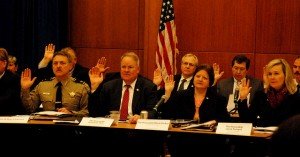
By Whitney Spicer and Blake Belden
Capital News Service
RICHMOND – Members of Gov. Bob McDonnell’s School and Campus Safety Task Force vowed Monday that their recommendations on keeping Virginia’s schools safe would be based on fact and not emotion.
The task force – charged with evaluating the safety of schools and campuses throughout the state – was assembled by McDonnell in the aftermath of the Sandy Hook Elementary School shooting last month in Newtown, Conn.
“I thought in the wake of that terrible tragedy, it would be prudent to get all of our leading experts from all disciplines together to gather around a table or two, and talk about what can we do better,” McDonnell said.
After a gunman shot and killed 20 children and six adults at Sandy Hook Elementary, some called for immediate measures, such as banning assault weapons or placing armed personnel in schools.
However, Marla Decker, Virginia’s secretary of public safety and a co-chair of the task force, said the group’s recommendations would not be reactionary but rather based on data, analysis and evidence.
“We must take a reasonable, methodical approach to school and campus safety,” Decker said. “This doesn’t mean that the task force should not think creatively – it should. But we must take a logical approach to sending recommendations to the governor and to the General Assembly.”
Some members of the task force are no strangers to tragedies such as the shooting in Connecticut. Task force member Allen Hill recalled the death of his daughter, Rachel, who at 18 was killed in the mass shooting at Virginia Tech in April 2007.
McDonnell noted that Virginians may have particular insight into what Newton residents are experiencing.
“Perhaps no state is more familiar with this kind of inexplicable tragedy than Virginia after April 16, 2007 at Virginia Tech,” McDonnell said. “Many of you have been a part of that recovery.”
When a deranged student killed 32 people at Tech, McDonnell was the state’s attorney general and Tim Kaine was governor.
After that massacre, McDonnell said, he and Kaine worked together and “came out with specific advice, an executive order and changes to firearms and reporting protocol all within 30 days. So I’m confident that if all of you take a look at where we are right now, you also can come up with some initial recommendations in a short period of time.”
McDonnell issued an executive order creating the task force on Dec. 20, just six days after the Sandy Hook shootings. He appointed the task force last week. It has 45 members, ranging from teachers, law enforcement officials and mental health practitioners to legislators, parents and students.
One of the task force members is state Delegate Margaret Ransone, R-Kinsale, a mother of two.
“I think that being a mom and wanting to make sure that our children are safe will absolutely play a part,” she said. “I have an 11-year-old and a 7-year-old, both in public schools. But because of the oath I took, my decisions will be fully based on the information that we have.”
The task force will have three main subgroups: education, mental health and public safety. These subgroups will work together to produce the most effective results, Decker said.
The task force plans to send its initial recommendations to the governor by Jan. 31. The first round of recommendations will focus on issues that require legislation or budget appropriations, Decker said.
The task force is scheduled to issue a final report by June.
McDonnell apologized to the panel for the tight deadlines. But he said time was of the essence.
“I think that we have a very important duty to make sure in our education system, K-12 or university, every person has the ability to work hard and gain access to the American dream and to do it in a safe and secure environment,” McDonnell said.
“For the most part we’ve been able to do that in our state pretty well. But I think these events have called upon us, once again, to look at all aspects of school and campus safety and say, ‘Is there something we can do better?’ ”
Who’s on the Task Force
Support Bristow Beat - Donate Today!